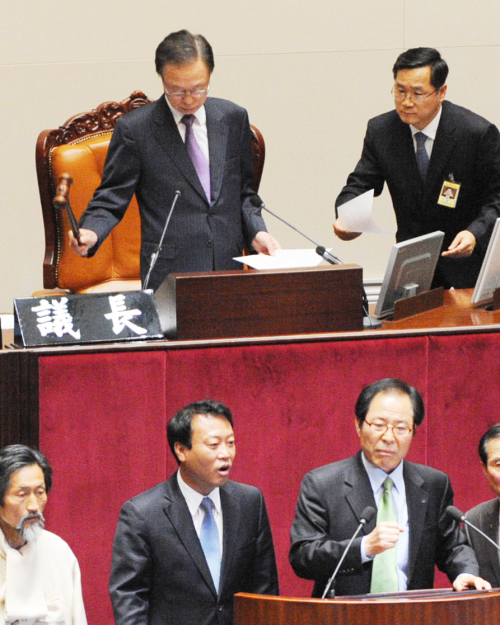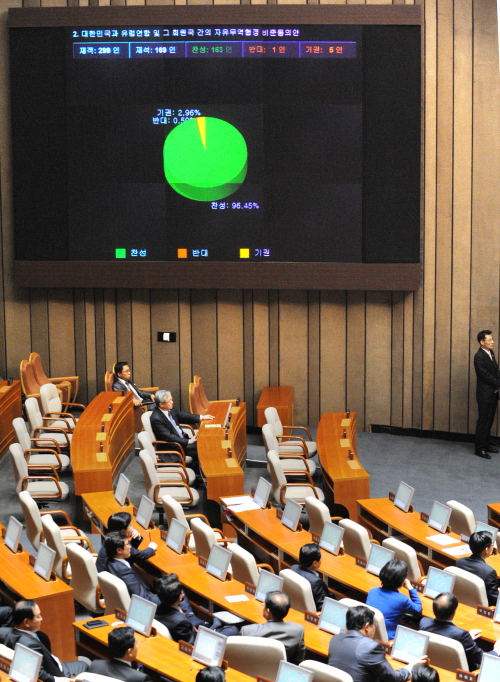
U.S. says images would inflame anti-U.S. sentiment, incite violence
The free trade agreement with the European Union, ratified by South Korea’s National Assembly on Wednesday after months of rickety proceedings, was widely expected to benefit the local manfuacturing sector, according to local business sources.
“Most manufacturing industries including automobiles, machinery, electronics, fabric and petrochemicals are expected to see exports to the EU rise through the Korea-EU FTA,” the Korea International Trade Association said.
With the tariff on automobiles ― up to 10 percent depending on engine displacement ― set to be removed within five years and that on auto parts removed immediately after the pact’s implementation, industry watchers here project auto exports to rise by as much as 1.5 trillion won on an annual basis.
The local trade agency projects that manufacturers of electronics, fabrics and petrochemical products will also be able to gain an advantage over Japanese and Chinese rivals in the European market.
The free trade agreement with the European Union, ratified by South Korea’s National Assembly on Wednesday after months of rickety proceedings, was widely expected to benefit the local manfuacturing sector, according to local business sources.
“Most manufacturing industries including automobiles, machinery, electronics, fabric and petrochemicals are expected to see exports to the EU rise through the Korea-EU FTA,” the Korea International Trade Association said.
With the tariff on automobiles ― up to 10 percent depending on engine displacement ― set to be removed within five years and that on auto parts removed immediately after the pact’s implementation, industry watchers here project auto exports to rise by as much as 1.5 trillion won on an annual basis.
The local trade agency projects that manufacturers of electronics, fabrics and petrochemical products will also be able to gain an advantage over Japanese and Chinese rivals in the European market.

The country’s scope of global trade also was seen to be given a boost, as Korea now has bilateral trade deals with six countries and regional groups: Chile, Singapore, ASEAN, India and the European Free Trade Association. In addition, free trade agreements with the U.S. and Peru are awaiting ratification.
There are negotiations for seven pacts involving 12 nations underway, and Korea is also working with a number of other nations including Japan and China to begin negotiations for trade pacts.
Ratifying the FTA with the EU was a lengthy and difficult process, mostly due to disagreements between political parties delaying proceedings.
The bill was also withdrawn and resubmitted to the National Assembly three times due to translation errors.
The actual vote on the motion began late Wednesday night due to friction between the ruling Grand National Party and the main opposition Democratic Party.
The opposition pulled out of the agreement with the Grand National Party to pass the bill, and boycotted the vote.
In the end, 169 lawmakers voted on the issue and the bill was approved with 163 voting in favor of the motion. Of the remainder, five abstained while one lawmaker voted against.
Of those who voted, 163 were members of the Grand National Party.
Despite the one-sided passing of the bill, local businesses and economic organizations are hailing Wednesday’s developments as an opportunity for significant economic gains for the country.
According to KITA, the pact could push up Korea’s gross domestic product by as much as 5.6 percent. The KITA also projects that Korea’s exports to the region will increase by $2.53 billion and imports by $2.17 billion on an annual basis.
The EU is the country’s second largest export destination after China. In addition, with Korea having recorded a trade surplus of $14.8 billion in dealing with the EU last year, the region represents a key market for local businesses.
Once the pact is implemented on July 1, as agreed with the EU, tariffs on more than 11,000 Korean products shipped to the region will gradually be removed, while 9,803 European products will become tariff-free over the course of five years.
According to a survey conducted by the Korea Trade-Investment Promotion Agency, 58 percent of 342 EU-based firms expect imports from Korea to increase following the pact’s implementation, with 69 percent citing improved price competitiveness as the main reason.
By Choi He-suk (cheesuk@heraldcorp.com)











![[Today’s K-pop] BTS pop-up event to come to Seoul](http://res.heraldm.com/phpwas/restmb_idxmake.php?idx=644&simg=/content/image/2024/04/17/20240417050734_0.jpg&u=)




![[KH Explains] Hyundai's full hybrid edge to pay off amid slow transition to pure EVs](http://res.heraldm.com/phpwas/restmb_idxmake.php?idx=652&simg=/content/image/2024/04/18/20240418050645_0.jpg&u=20240419100350)

![[Today’s K-pop] Zico drops snippet of collaboration with Jennie](http://res.heraldm.com/phpwas/restmb_idxmake.php?idx=642&simg=/content/image/2024/04/18/20240418050702_0.jpg&u=)